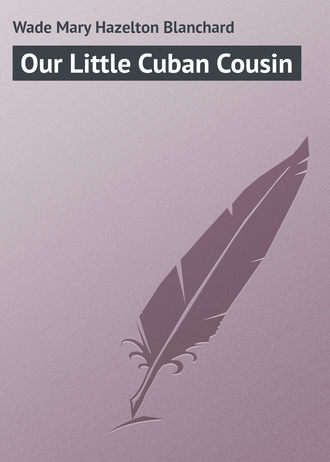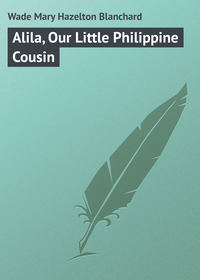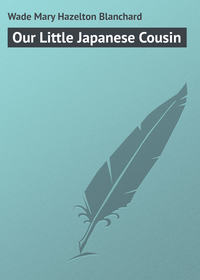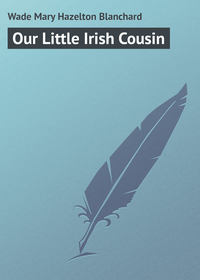 полная версия
полная версияOur Little Cuban Cousin
It was not many minutes before Maria and Isabella were fairly ablaze with lights. Then they danced into the house to be admired by their parents.
"Now let's take them off and put them in those wicker cages you made last summer, Ramon," said Isabella. "I'm sure the poor little things are tired of hanging from our clothes. They must wish to fly around once more. They will not mind being shut up in the cages for a day or two, if we give them plenty of sugar to eat."
"All right, but I wouldn't keep them shut up long enough to make pets of them," said her brother. "I cannot help believing they would rather be free."
As he said these words, there was a step on the garden walk, and a moment later a strange man stood in front of the children.
"Is your father at home?" he asked. "I have a message for him."
Ramon hurried into the house. Señor Diaz came out and spoke with the stranger in low tones. When he went back into the sitting-room he carried in his hand a piece of paper that looked perfectly blank. The stranger had disappeared again into the darkness.
"What did the children's good father do with that paper?" you ask.
He went quickly to his desk and put it under lock and key. Nothing could be done with it till the morning sun should light up the eastern sky.
"Then what?" you curiously ask again.
If we could have watched Señor Diaz, we should have seen him go to his desk once more, take out the precious paper, and go over it with a hair pencil dipped in a bottle of colorless liquid.
After that, we should have seen Maria running with the paper to the window, where the sun's rays would dry it quickly. Lo and behold! writing began to appear which threw the whole family into a great state of excitement. These were the words:
"The U. S. warship Maine has been blown up. The Americans are roused. They believe without doubt that the Spaniards are the doers of the terrible deed. Victory shall be ours at last, for the United States will now surely take our part against Spain."
There was no signature to the letter.
That very night Maria's household were wakened by a brilliant light pouring into their windows. It came from the burning plantation where Lucia had her home. When morning dawned there was no trace of a building left on the whole place. No person was injured, however, but Lucia and her parents went to friends in Havana. The rich planter had become a poor man in a single night.
Who had set the fire? It was probably the insurgents, who had discovered that the planter was a friend of the Spaniards and was secretly working against the freedom of Cuba.
CHAPTER IX.
FIRST YEARS IN THE NEW WORLD
"Papa dear," said Maria, one evening not long after this, "why did our people ever leave Spain and come here to make a home for themselves? Of course, they had heard what a beautiful island it is, but was that the only reason?"
"They had indeed heard this, my child, but they also believed they could become rich by raising sugar-cane or tobacco. Great fortunes were made in the old days on the plantations here. My own grandfather was a very wealthy man.
"But you know the story of Cuba since then. The heavy taxes and the cruel laws of Spain caused my relatives, as well as thousands of other families, to lose their fortunes. We have tried to free ourselves many times but have not succeeded yet."
"Well, don't be sad, papa dear; the good time is coming quickly now, you know. We have not had as hard a time as the poor savages Columbus found here, anyway. How I do pity them!" said Maria, with her eyes full of tears.
"Yes, they had a sad time of it indeed," her father went on. "They thought at first the white men were angels and the boats they sailed in were beautiful birds that had brought the visitors straight from heaven. But they soon changed their minds.
"Columbus was greatly excited when he looked upon the plants and trees so different from any he had ever seen. He said: 'I will call this place the "Pearl of the Antilles,"' and so it has been called to this day. He also wrote of it, 'It is as much more grand and beautiful than any other land as the day is brighter than the night.'
"I suppose you know, Maria, that Columbus visited Cuba four times, and yet he never discovered that it was an island."
"I wish you would tell me more about the savages he found here," Maria said. "Of course, I know there is not a trace of them left in the land. Their hard work in the mines and the cruel treatment of the Spaniards soon killed them off. Oh, it is a wicked, wicked shame!"
"Their skins were bronze in colour, like the Indians of North America; but they did not know where their own people came from. Once they were asked this question by one of the white strangers. They only answered by pointing their hands upward. It was as much as to say, 'From heaven!'
"The women had long and beautiful hair, but the men had no beards whatever. They painted their bodies with the red earth so common on the island, and adorned their heads with the feathers of brilliant birds.
"They lived mostly in the open air, and slept in hammocks under the trees. They made their hammocks out of the wild cotton you have seen growing in the fields. The women spun and wove this into the only cloth they ever used.
"They had no gardens. They had no need to plough and plant, for nature gave them all they needed. There were many fruits growing wild then, as now. They picked the delicious mangoes, bananas, and custard-apples which were so plentiful. They gathered the yams and maize which also grew wild all over the island. What more could they wish?"
"I should think they would have liked a little meat once in awhile," said Maria, who had been very much interested in everything her father said.
"Certainly," he replied, "these savages liked hunting, and often brought home game to be roasted. They were very fond of the meat of the iguana. You have often seen this reptile, Maria."
"Oh, I know," she replied; "Ramon shot one only the other day. It is like a big lizard."
"Yes, that is true. The Indians also hunted the voiceless dog, as we sometimes call the creature even now. I hardly know why the Spaniards gave it such a name. It is more like a rabbit than any other animal. There were great numbers on the island in the old times."
"You said the Indians slept mostly in hammocks," said Maria. "Didn't they have any houses?"
"Oh, yes, but they stayed in them very little, except during the rains. They built them of wood and palm leaves. They were clustered together in villages. Sometimes there were two or three hundred houses in one settlement, while several families used one house in common."
"How did they defend themselves?" Maria asked, as her father stopped speaking.
"They had lances pointed with sea shells, and wooden swords," he replied. "These were more for show than for use, for you know they were a sober, peaceful people. Such weapons would have been of little use if they had tried to fight with the Spaniards. The easiest thing would have been for them to leave the island and seek a new home. But they were not wise enough for that, although they had large canoes in which they might have travelled to some distance. They dug them out of the trunks of trees. Some of them were large enough to hold fifty men. Their oars were well shaped, but they used them only as paddles. They had no row-locks.
"They were a happy people, although quiet and serious in most of their ways. They used to dance and sing at their merry-makings, and their music was quite sweet."
"Papa dear, if you are not too tired, won't you tell me again about the great Spaniard who was entertained by the Indians? It was before they learned to fear the white strangers, and they still believed they were friends."
"Let me see, little daughter. Oh, yes, now I know whom you mean. I told you that story long ago. I am surprised you should remember it.
"It was Bartholomew Columbus, who was sent to act as governor during the admiral's absence. He passed from one place to another on the island to collect tribute from the chiefs. These chiefs had already learned how eager the Spaniards were for gold; so they gave it to the governor freely and cheerfully. That is, of course, those who had it. But if they could not give this they presented the white man with quantities of the wild cotton.
"There was one chief who prepared a grand entertainment in honour of his visitors. A procession of women came out to meet them, each one bearing a branch of the palm-tree. This was a sign of submission. After the women, came a train of young girls with their long hair hanging over their graceful shoulders.
"A great feast was spread in the chief's palace and the visitors were entertained with music and dancing. When night came, a cotton hammock was given to each to sleep in.
"For four days the feasting and games and dancing were kept up. Then the visitors were loaded with presents and their dark-coloured hosts kept them company for quite a distance as they journeyed onward to the next stopping-place.
"Could any people do more to show themselves friendly than these poor, gentle savages? Ah! how sadly they were repaid for their trust in the white men!
"But come, we have thought enough about the past. Let us return to the present and the great things that are daily happening around us."
CHAPTER X.
THE MERRIMAC
Every day now was full of excitement for the Diaz family. Letters were often brought to the house by some secret messenger. Each time they told of some new and surprising event.
The insurgents were braver than ever before. They dared more because they knew of the good friends coming to help them. Yes, the United States was getting troops ready to meet the Spaniards on Cuban soil. And our great war-ships were gathering also. They, too, were coming to help Cuba.
The great battle-ship Oregon was speeding through two oceans that she, also, might take part. The eyes of the whole world were watching her voyage, and millions of people were praying for her safety. How we love the Oregon to-day and the brave captain and sailors who brought her safely through her long journey!
One little American boy, only nine years old, felt so sorry for the suffering children of Cuba that he wrote these words:
"War, war, war on Spain,Who blew up our beautiful, beautiful Maine.Think of the poor little Cuban dears,Think of their hardships, their sorrows, their tears,Who die every day for the want of some food;Wouldn't you be in a fighting mood?Then hurrah! for the soldiers who nobly do fightIn the cause of the weak and for Nature's great right."This is not very good poetry, but it shows the deep feeling of our children for their little Cuban cousins.
Maria, in her pretty little home under the palm-trees, was spared, yet, as she and we knew, there were thousands of children no older than herself who suffered and died before Cuba was free. Our little cousin was delighted when she knew that the American fleet was actually close to the shores of her land.
But the Spanish war-vessels were here too. They were lying in the harbour of Santiago. It was at the other end of the island, but news passed from one to another very quickly among the insurgents. Ramon drew pictures of the two fleets as he imagined they looked. He made new pictures every day. How he longed to see them with his own eyes! I really fear that he would have run away from home and joined the army at this exciting time, if he had not loved his parents so dearly.
Why did the Spanish fleet stay in the harbour of Santiago? Why did they not go out and meet the American war-ships? Were they afraid? It certainly seemed so. They believed they were in a very safe place. There was only a narrow entrance to the harbour. It was defended at each side of this opening, for on the left were new batteries which had lately been set up, and on the right was the grand old Morro Castle which had stood there for hundreds of years. In the olden times it had defended Cuba against her enemies more than once.
"Morro" means hill, and the fortress at Santiago was well named, for it is built on a rocky promontory several hundred feet high, at the junction of the open sea and the San Juan River.
Mines were sunk in the narrow entrance to the harbour so that, if the American ships should dare to enter, they would explode these mines and be destroyed like the Maine. It was no wonder the Spanish admiral thought they were safe in staying where they were.
Then it happened that a young American thought of a plan by which the Spaniards might be caught in a trap. His name was Lieutenant Hobson. It was a very daring plan, but he was a wonderfully brave man.
He said to Admiral Sampson, who commanded the American fleet:
"Let me take the Merrimac. It is a coaling vessel and very heavy. It has six hundred tons of coal on board. We can place torpedoes in different parts of the ship. A few men can help me sail her into the channel. When the narrowest part is reached we will fire off the torpedoes and escape from her before she sinks. That is, we will do so if we can. But the Merrimac will be across the narrow channel and the Spanish ships cannot get out. Our own ships will then be free to attack another part of the island. The Spanish seamen will have to remain where they are till they are glad to surrender."
Admiral Sampson had thought of many plans, but he liked this one of Lieutenant Hobson's best of all.
But who should be chosen to go with the brave man on this dangerous errand? Chosen! Why, there were hundreds who asked to share his danger, and only six could go with him. You would have thought it was some great festival they longed to take part in, if you could have seen how disappointed the men were, who had begged to go and were refused.
But no, it was a fight with death. To begin with, the Merrimac must pass the batteries and Morro Castle. She and those on board might easily be destroyed before she reached the place where the work was to be done. And then, when her own torpedoes should be fired off, how could Hobson and his men expect to escape from the sinking ship?
But they were risking their lives in the cause of those who needed their help. You and I know now that they were brought safely through all the dangers which surrounded them.
The Merrimac passed the guns of the Morro unharmed, for the Spaniards were poor marksmen. She reached the narrow channel where Hobson meant to do his great work. But a shot from the batteries knocked away her rudder, so they could not steer her across the narrow channel. Then a great mine exploded under her and tore a big hole in her side. She began to sink.
Hobson and his men lay flat upon the deck. Shells and bullets came whizzing about them. They dared not rise, even though the ship was breaking apart as the shells crashed through her sides.
At length the Merrimac had sunk so low that the water was up to her deck. A raft floated close to the men. It was one they had brought with them to help in escaping. They caught hold of the edges and kept their heads above water.
Just then a Spanish launch drew near. The men on board were about to fire when Hobson cried out and asked if an officer were in the boat, as he wished to surrender. Admiral Cervera, the commander of the Spanish fleet, had himself sent the boat. He ordered the firing to cease and accepted Hobson and his men as prisoners of war.
When the news of Hobson's brave deed reached Maria, she could think of nothing else for days afterward. She would picture him in his cell at Morro Castle, looking out to sea where the American fleet were still cruising.
"How proud of him they must all be!" she cried to Ramon.
"They can't be any prouder of him than we are to have such friends as he," the boy replied. "Why, he will be looked upon now as one of the greatest heroes the world ever knew. I shall always be proud of Morro Castle because of his having been confined there.
"You know, we went all over the place when we were little, Maria. I believe he is kept prisoner in that part of the castle which is built over the water cave. You know we heard that he can look far out on the sea from his windows.
"Think of the dungeons underneath, where people were locked up years ago. We peeked into one of them that day we visited the fortress and I remember how dark and damp they were. I do hope Hobson is treated well and won't have to stay at Morro very long."
CHAPTER XI.
VICTORY
It was only a few mornings after the news of Hobson's brave venture. The children were out in the garden, where Ramon had discovered a chameleon on a grass plot. It was a sunny day, so perhaps that was the reason the chameleon's skin was such a bright green.
"You know how gray they look on dull days," said Ramon. "Perhaps if I should put him on the branch of that tree, now, he would change to a brownish tint, to look as much as possible like it. He's a stupid little thing, though. If he does change colour, I don't believe he knows it himself. Mother Nature takes care of him, you know, and makes him change as a kind of protection. He has no way of defending himself, but if he is of the same colour as the substance around him, it is hard for his enemies to find him.
"Oh, dear! it makes me laugh when I think of a battle I once saw between two chameleons. They stood facing each other. Their small eyes glared as they slowly opened and shut their jaws like pairs of scissors. They moved about once a minute. I did not have time to see which won the battle; it took too long a time for them to do anything."
As the children stood watching the lizard they heard the sound of hoofs down the road. Then there was a cloud of dust as a horseman came riding rapidly along. He turned in at the driveway.
"What news? What news?" cried Ramon, who rushed to meet him.
It was an old friend of the family who had given secret help to the Cuban soldiers throughout their struggle for freedom.
"Of course, you knew the American troops had landed, didn't you? Well, run in and ask your father to come out. I can only stop a moment and I have much to tell him."
The gentleman had hardly stopped speaking before Señor Diaz appeared on the veranda. He was told about the position of the Americans not far from Santiago. They had met General Garcia, the brave leader of the insurgents. The Cuban and American armies were now working together. Battles had already been fought with the common enemy.
But that which interested the children most was the story of the Rough Riders and their daring charges at El Caney and San Juan Hill. Many of these Rough Riders were men who had led a wild life on the plains in America. Some of them had no book-learning; they were not what one usually calls "gentlemen;" but they were great horsemen and brave soldiers. They feared nothing in the world.
They were commanded by Colonel Wood, and had been recruited by Lieutenant-Colonel Roosevelt, who had been out on the plains among them when a young man. He admired their spirit and was glad to be their commander now. He knew their ways. He led them up the San Juan heights when the enemy was protected by forts and shooting right and left at the Americans. But the Rough Riders charged onward with great courage and gained the summit. They took possession of the blockhouse at the top, and killed most of the Spaniards and drove the rest away. It was a glorious fight and a glorious victory.
"A few more deeds like that, and war and trouble will be ended for us," said the gentleman as he rode away to carry the good news to others.
"Hurrah for Lawton and Roosevelt!" shouted Ramon as he danced about the garden. "Santiago will soon be out of the hands of the Spaniards, and they will be clearing out of Cuba altogether. It seems as though I could not rest without shaking hands with our American friends."
The dear boy did not have long to wait, for the very next day came the news that the Spanish fleet had been destroyed. It had tried to escape out of the harbour, but had been discovered by the watchful Yankees. In a few hours all of Spain's war-ships had been sunk or driven ashore.
What was now left for Cuba's tyrants? The battle-ships of the Great Republic were ranged along her shores unharmed and strong as ever. The Spanish troops were shut up in the city without hope of escape. Surrender was the only thing possible to ward off great loss of life on both sides.
The Spanish commander made a formal surrender to General Shafter, and Spain's empire in the West Indies came to an end almost on the very spot where it had begun four hundred years before.
And now the mines were taken out of the harbour and our battle-ships could enter in safety. As our vessels glided inside one after another they made a wonderful picture. The harbour seemed alive with boats, and it looked like a floating city.
Still grander was the sight on land when thousands gathered around the governor's beautiful palace at Havana to see the stars and stripes of America unfurled. As the flag spread its folds to the breeze, the band struck up the air we love so well. It was the "Star Spangled Banner." Boom! boom! went the cannon, and thousands of American and Cuban hearts were filled with joy.
"Victory! Victory!" shouted Ramon, when the good news reached him that night. And "Victory!" cried little Isabella, who added with all her childish might, "Long live Cuba." Even the parrot echoed the words of the children. He seemed to feel that something very great must have happened, for his voice was shriller than usual.
In fact, the family could have no peace in the house, even if there were peace all over Cuba, till Master Poll's cage had been covered with a thick, dark cloth, and he was made to believe that night had suddenly fallen upon his home.
CHAPTER XII.
HAVANA
"Children, would you like to go to Havana and visit our good friend Señor Alvarez for a week? He has invited us all to come and talk over the good fortune that has come to our land. You can have a good time seeing the sights."
Of course the children were delighted at their father's words; so it came to pass that Maria found herself, a day or two afterward, in a beautiful home in the very heart of the great city.
It was a grand house to her childish eyes. It was all of stone, covered with a yellowish stucco. It was at least a hundred years old, she was told. It was built around the four sides of an open square, and had no piazzas on the outside like her own home. But the court inside was very beautiful. A fountain played here all day long, and there were blossoming plants standing in pots on the marble floor.
The family spent much of their time on the verandas in this court. It was far pleasanter than inside the house, where the windows were so heavily barred that they made one not used to the custom feel almost as if he were in a prison. The doors of the house were bullet-proof to make it safe against attack. There was but one entrance to the house, and that led directly into the court. Here the family carriage always stood unless it was in use.
The gentleman who lived here had one son, a little older than Ramon. He showed the children all around the city. As they went from place to place, he told them how hard his father had worked to raise money for the Cuban soldiers. His mother sold all her jewels, that she might help, too. But they had to do this secretly, of course. If the Spaniards had discovered it, they might have lost their lives. This boy's name was Blanco. He was a fine, manly fellow, and was looking forward now to coming to America.
"I shall go to Harvard College," he told Maria. "I wish to be a minister, but I'm afraid if I do become one, I shall not feel like praying for the Spaniards."
The boy's heart was still bitter, but perhaps he will feel more kindly when he grows older.
One day he took his young friends out to Morro Castle. Havana has a hill fortress of that name, as well as Santiago. Although Hobson and his men had never been imprisoned in this one, yet the Diaz children were glad to see it.
It stood on a rocky point reaching into the sea. The great guns were still pointing out between the masses of yellow stone. But they were silent. The American flag was waving and peace ruled in the land, although soldiers were on guard here and all through the city.









